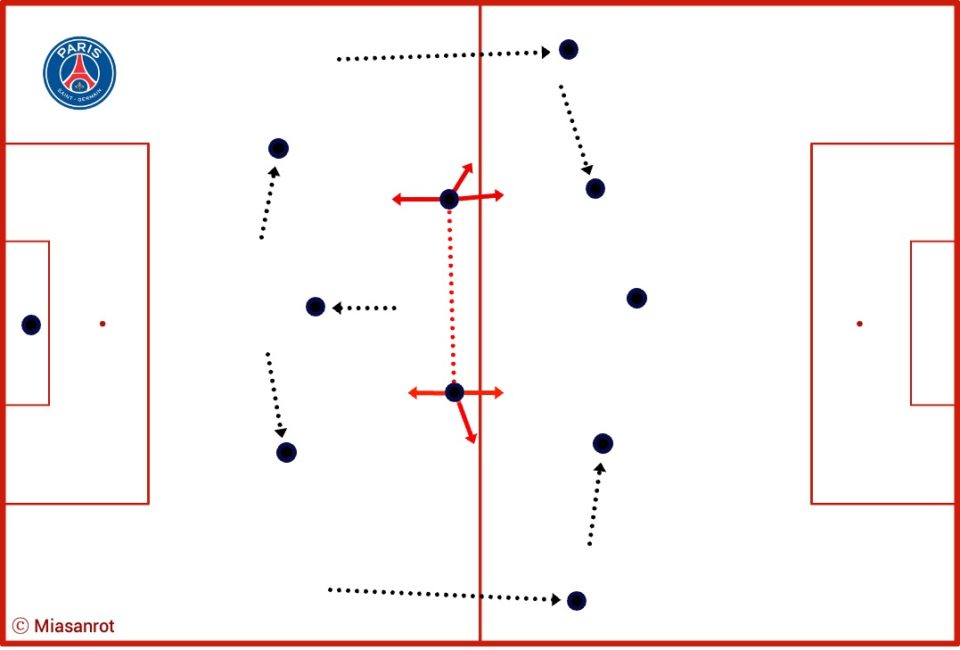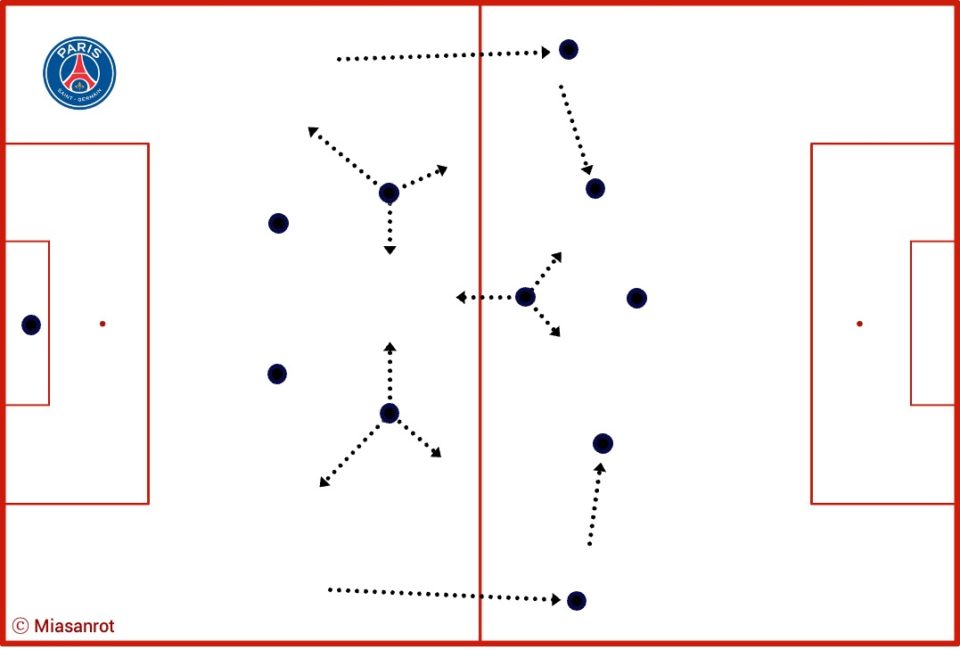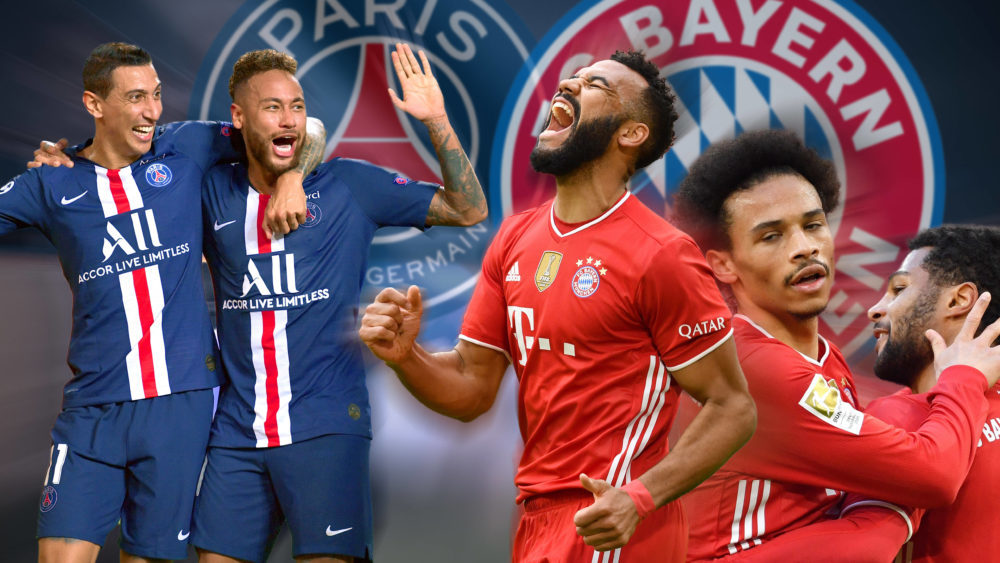CL Quarter Final first leg Preview: Bayern vs. PSG
Paris is having quite a mixed season. Just a few weeks ago, Thomas Tuchel was sacked despite his success last season. The new man on the touchline is Mauricio Pochettino. When he was in charge of Tottenham, the Argentine proved that he knows how to lead an individually inferior team to the Champions League final. Unfortunately from his perspective, he lost the game against Liverpool.
His record playing against FC Bayern is not exactly breathtaking – but it also does not contain too many games. He has met the German record Champions only once, a contest he lost with two goals to seven. It seems rather unlikely that this time around the Bayern team will achieve a similar feat against Pochettino’s new team. PSG have already played 20 competitive games under their new coach, winning 14, losing 4 and drawing 2 – nothing that will send ripples of excitement through the French capital or Qatar, but not a manifest crisis either.
Pochettino did not succeed Tuchel only for sporting reasons, but because the German had repeatedly crossed swords with the club’s sporting management, especially sporting director Leonardo. In terms of results, not much has changed since then at PSG, and the quality of the football they have been playing since the change of coach casts serious doubts on whether the city of Paris will be able to celebrate winning the Champions League trophy this year.
High flying dreams, not much substance
For even if little is known about the specifics of the points of contention between Tuchel and Leonardo, it does not take an insider’s knowledge to detect obvious sticking points in the planning of the squad between them. The squad as a whole does not live up to what its individual names suggest. Over the last few years, there have been many prominent names in the dugout. They all failed either in forming the many stars into a coherent unit or in assembling the right player types for success. Most PSG teams of the last few years have had in common that up front there has always been potential for spectacle. Zlatan Ibrahimović, Edinson Cavani, Ángel Di María, Kylian Mbappé or Neymar – they all are or have been top class players in the final third.
At the back, on the other hand, PSG in the recent past were very dependent on the performance of their captain: Thiago Silva. The Brazilian always held the show together as well as he could. However, the team never contained real quality besides him and so his departure could not be compensated properly defensively. In midfield, there has been a lot of light and shadow in recent years. Besides Marco Verratti, there have been other players with great potential. But only rarely did PSG’s performances at the highest level give you the feeling that the many individual parts fit together well.
Tuchel was the first coach able to put the pieces of the puzzle together so well that PSG reached the Champions League final under his stewardship. He balanced the team strategically and tactically and made sure that everybody understood that they were worth only half as much without each other. In the end, he and his team failed by the narrowest of margins against FC Bayern. Nevertheless, just a few months later, the man who made this success possible had to leave. The discrepancy between the amount of money PSG have pumped into the transfer market in recent years, their ambitions, and what the coaches ultimately have had available in the squad is simply too great.
Can Pochettino do what no one before him has been able to do?
So now Pochettino is the latest PSG coach to try his hand. He interprets football a little differently from Tuchel, he focuses more on counter-attacking situations and gegenpressing moments, and less on controlled possession. But what both have in common: They both prefer front-footed football. Highly vertical play and tempo have remained decisive factors for PSG under the new coach. Perhaps the game has even become more direct.
Pochettino’s teams are known for trying to move the ball up high with great resolution. That will also be his plan against Bayern. The Argentine does not experiment much within his default set-up. PSG will very likely start with a back four. The only question will be whether Pochettino is going to opt for a 1-2 or 2-1 shape in the center.
But Bayern can expect a very intense game in either case. Pochettino already played a high and aggressive pressing game when he faced them with Tottenham. He went on to establish the same style of play at PSG. Normally, the aim is to give the opponent as little time as possible to make a decision, in fact not at all unlike Bayern. It is noteworthy before the clash, however, that both teams are not at their best level currently. On the one hand, they are battered by absences and, on the other, the pressure is enormous.
Both teams could deviate from their preferred style of play
It is conceivable therefore that Pochettino will have his team unleash its full force only during some phases of the game. In the 4-1 win over Barcelona, for example, his team only managed 16 pressures in the attacking third (i.e. moments in which a player closed down the opponent in possession to less than 3.5 metres). By comparison, when Bayern won 8-2 against Barça, they had 60 pressures. So Pochettino by no means seems to commit his team to attacking pressing no matter what, but adjusts the height and type of approach depending on the opponent.
This probably not least because he knows that with Neymar and Mbappé he does not have two of the most outstanding pressing players in his ranks. It might make more sense to put them in a slightly deeper position in which both can focus on creating spaces. That is what will happen against Bayern. The two exceptional players will try to make the passing angles for the Bayern central players (Kimmich, Goretzka, Müller) more difficult or even impossible. Without the ball, Pochettino uses a mixture of formations: The classic 4-4-2 is usually his choice, but he has also used a 4-4-2 diamond in pressing every now and then throughout his career. It is quite conceivable that for the away game at Bayern the coach will sacrifice one the four offensive players (in which case Moise Kean would probably be the one out) and instead aim for a little more compactness in midfield.
Even in the classic 4-4-2, PSG are very compact and aggressive in midfield. If they find their passing lanes blocked up front too often, the French are likely to take their opponents on in one-on-one challenges in order to steer them out wide or win the ball directly off of them. Even though PSG are short several important players in midfield, they are able to intercept Bayern’s passes and then advance the ball quickly. Besides Verratti (COVID-19), Leandro Paredes in particular will be missing (third yellow card). The Argentine is the heart of PSG’s build-up play and responsible for setting the pace. With his dangerous diagonal switches of the play, he would have been an important asset against Bayern.
PSG with the ball: fast and direct
Paredes is someone who through his play also affords his teammates a rest sometimes. This is particularly important for Pochettino’s style of play because he expects a high tempo from his players. Ideally, the ball should be moved to the final third with as few touches as possible, so as not to give opposing teams the opportunity to put the build-up players under pressure. It is also clear that such an approach will not work over 90 minutes and that increased speed usually goes hand in hand with a higher error rate. This is why PSG need players like Paredes, who make smart decisions under pressure and let their teammates take a breath.
Verratti, too, is someone who is responsible for setting the pace at PSG. The fact that both are out for the first leg is a bitter loss for the team. Structurally, Pochettino must now find ways to include the midfield center in his approach. Idrissa Gueye is more of a “clearer” and less known for his ability to build up play. If he does come on, he is more likely to harass the opposing players. In the 4-2 win against Lyon, Danilo Pereira played alongside Gueye, someone who is more capable of making up for Paredes’ absence – but is he able to do it at Champions League level? Doubtful.
On paper, Ander Herrera is the best possible available replacement. The Spaniard showed a few months ago in the final against Bayern that he can play outstanding passes. He is the playmaker Pochettino might need in Munich, even if he is not quite as complete a player as Paredes. Unfortunately for him, Herrera has not found into a rhythm recently. After missing many games in January and February, he has only been used irregularly of late.
Basic shape: high full-backs, half-space focus and dynamic movements.
For Pochettino, the central midfield is of crucial importance. Not only because at least one of PSG’s two deeper-positioned midfielders is responsible for helping to build the game, but also because the two flanks are an essential factor in the team’s game going forward. The Argentine works mostly with narrow wingers and full-backs who push high to provide the width. The task of the players in central midfield is to protect the full-backs during build-up play, but also to push forward efficiently to close the gaps in front of them. In other words, they act as a link between the defensive and attacking thirds.

This works as shown here with a holding midfielder dropping in between the center-backs, allowing them to shift out wider. In that case, the number eights are responsible for linking up the parts of the team.

But it also works with a clearer double pivot, where one of the two midfielders can drop off diagonally next to the center-backs to achieve the same effect. As a result, the central offensive playmakers and the remaining holding midfielder are then responsible for occupying the midfield appropriately. Moreover, both wing-backs do not always push up. Often, the far side full-back also provides protection at the back, which enables the midfielders to overload the half-space near the ball.
In fact, this is an important element of PSG’s game under Pochettino: The upper half of the pitch and the interline spaces should always be occupied in order to reach them through the wide players. To achieve this, the coach uses many diagonal passes. A typical move under him looks like this: a midfielder drops into the back line to draw the opponent apart vertically. This is followed by a diagonal pass to one of the full-backs. Most opponents will now start to attack the full-back on the ball to build up pressure. At the same time, this serves as Bayern’s a signal to press.
Even before the full-back receives the ball, however, the midfielders and forwards are supposed to position themselves within a dynamically interpreted triangle in such a way that the full-back can play a diagonal pass back into the center of the pitch or at least into the half-space. Pochettino therefore does not use vertical passes alone to play through pressing lines, but often takes a roundabout way via a third player. In doing so, he relies largely on the intuition of his players, who have a relative freedom of movement on the field. The all important thing is that the criticise spaces are always occupied, no matter by whom.
How Bayern can beat PSG
PSG is undoubtedly capable of beating Bayern. Nevertheless, the reigning Champions League holders should be the favorites. The crux of the matter from Hansi Flick’s point of view is how well his team can get a grip on PSG’s two exceptional attacking players without limiting their own options too much. The key arguably lies in the pressing.
Recently, Bayern have been able to gain a fair degree of defensive stability with the full-backs bombing forward less and rarely pushing high up into the opponent’s half when Bayern are not in possession. Pressure on the opposing full-backs mostly came from the offensive wingers. Against Paris, such a more measured version of Flick’s full-throttle pressing is also conceivable, especially because it would be easier to control the French full-backs pushing up the field this way. Even if it seems unlikely in view of the last few weeks and months, Lucas Hernández might even be an option for Flick to add defensive stability. Compared to Alphonso Davies, he is a better tackler and also better at positional play. The Canadian could thus also feature as a more offensive option from the bench if Bayern need to step up their attacking efforts in the second half. On the other hand, Davies will still be out in the Bundesliga next weekend due to his yellow card suspension, which would mean that he would then have been out of the starting eleven for three games.
Regardless of the personnel, it will be crucial for Bayern to always keep a close eye on the backs of their teammates and make sure that PSG do not find the passing lanes to Neymar, Mbappé and Co. in the first place. Under Flick, pressing is always of great importance, but in this game perhaps even a touch more so than usual. Bayern has the chance in the first leg to catch a PSG side without Paredes and Verratti in midfield cold. In this respect, it is to be expected that the Bayern team will deploy a high intensity press right from the start.
Another indication of this is that Flick cannot bring on much from the bench. The first eleven has plenty of quality, but behind it things will be tight again. Only Jamal Musiala is available as an offensive option. Against Leipzig, Bayern were very strong and balanced for 45 minutes, but in the second half they found it harder to maintain their initial pace. Against PSG, more of what they showed in the first half is needed. That also includes the integration of Eric Maxim Choupo-Moting. Against Leipzig, he was an important factor for a long time in relieving the pressure forward against Leipzig’s pressing, because he not only positioned himself cleverly between the lines, but also did clever things with the ball.
Like Leipzig, Paris will also start with a back four. That could suit Müller and Choupo-Moting. Both are very dynamic players who are on the move a lot and can thus possibly create spaces for Leroy Sané and Kingsley Coman. Especially if one or even both of the Parisian full-backs are positioned higher, Bayern might be able to use this to their advantage in transition situations.
What kind of game will it be?
For both teams, the personnel situation could have just as much impact on the game plan as the consideration of their opponents. Both are in a very different condition than in last summer’s final. In the second leg, Bayern will most likely be more rested because they can afford a little more rotation in the league. But on this Wednesday night PSG, despite their midfield problems, have the opportunity to hurt Bayern in their own ground and take away a goal or two.
It is difficult to predict what kind of game it will be. Normally, it would probably be one in which Bayern have the ball and Paris are attempting to release Neymar and Mbappé. But Flick has recently proved that he can adapt. Bayern will certainly be pressing – but not, as has often been the case, at all costs.
On paper, Bayern are the more mature and balanced team. While PSG keep tripping themselves up, Bayern seem to have found their inner center in recent weeks. Just last weekend, the reigning Champions League winners showed once again that they can step things up when it counts.
Paris often lacked this quality. Against Bayern, they will want to show that they belong among the greats. And if they really succeed, there might even be a small hint of celebration in Paris this time. As for Qatar, on the other hand, there will definitely be one or two people there who are happy about the result either way. It’s not for nothing that people are reported to joke about the Qlassico here and there on the internet.









